|
|
|
Sort Order |
|
|
|
Items / Page
|
|
|
|
|
|
|
| Srl | Item |
| 1 |
ID:
192267
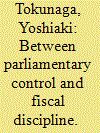

|
|
|
|
|
| Summary/Abstract |
The budget system is a fundamental component of modern constitutional politics. It works for the establishment of not only the fiscal discipline, but also for parliamentary control over tax and fiscal policies. This study aims to portray controversy between these two principles over the legislation of the General Budget Act for 1303/1924-25, the first comprehensive budget law in Iran. An analysis of parliamentary and other contemporary sources reveals how the National Assembly prioritized their control over budget-making, whereas Administrator General of Finance Millspaugh (1922–1927) struggled to maintain fiscal discipline. The lack of cooperation between them consequently benefitted Prime Minister Reza Khan (1923–1925; later Reza Shah Pahlavi 1925–1941), who desired to seize full control of state finance. These findings contribute to a deeper understanding of the constitutional politics on the eve of Pahlavi rule, as well as the process of Reza Khan’s rise to power.
|
|
|
|
|
|
|
|
|
|
|
|
|
|
|
|
| 2 |
ID:
044146
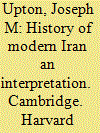

|
|
|
|
|
| Publication |
Cambridge, Harvard University Press, 1965.
|
| Description |
vi, 164p. pbk
|
|
|
|
|
|
|
|
|
|
|
|
Copies: C:1/I:0,R:0,Q:0
Circulation
| Accession# | Call# | Current Location | Status | Policy | Location |
| 000533 | 955.052/UPT 000533 | Main | On Shelf | General | |
|
|
|
|
| 3 |
ID:
001019
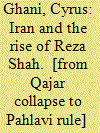

|
|
|
|
|
| Publication |
London, I B Tauris, 1998.
|
| Description |
xiv, 434p.hbk
|
| Standard Number |
1860642586
|
|
|
|
|
|
|
|
|
|
|
|
Copies: C:1/I:0,R:0,Q:0
Circulation
| Accession# | Call# | Current Location | Status | Policy | Location |
| 040540 | 955.052/GHA 040540 | Main | On Shelf | General | |
|
|
|
|
| 4 |
ID:
040749
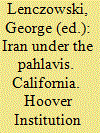

|
|
|
|
|
| Publication |
California, Hoover Institution Press, 1978.
|
| Description |
xxii, 550p.hbk
|
| Standard Number |
0817966412
|
|
|
|
|
|
|
|
|
|
|
|
Copies: C:1/I:0,R:0,Q:0
Circulation
| Accession# | Call# | Current Location | Status | Policy | Location |
| 018206 | 955.05/LEN 018206 | Main | On Shelf | General | |
|
|
|
|
| 5 |
ID:
180026
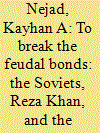

|
|
|
|
|
| Summary/Abstract |
From 1921-25, the USSR normalized its relations with Iran, withdrawing support from the Soviet Socialist Republic of Iran in the northern province of Gilan (SSRI, 1920-21), and signing the Irano-Soviet Treaty of Friendship in February of 1921. Thus far, most scholarship has argued that material interests, and especially Soviet designs on Iranian oil, compelled their anti-revolutionist turn in Iran. This article, which draws upon original collections from the Archive of Foreign Policy of the Russian Federation (AVPRF) and others, argues that the defeat of the SSRI did not mark the final Soviet attempt to socialize Iran, but rather the first of several that recruited leftist parties, tribal actors, and even the Shi‘ite clerical establishment until 1923. Secondly, this article argues that the Soviets eventually threw their support behind Reza Khan not only because some senior policymakers believed that his modernizing authoritarianism would provide the preconditions for Iranian socialism, but also because of a growing hostility to the Iranian left, whose revolutionary designs the Soviets eventually deemed premature. These findings are supported by archival diplomatic reports and communiques, which the author employs to interrogate the knowledge production intended by the Soviets to justify their anti-revolutionist turn in Iran.
|
|
|
|
|
|
|
|
|
|
|
|
|
|
|
|
|
|
|
|
|